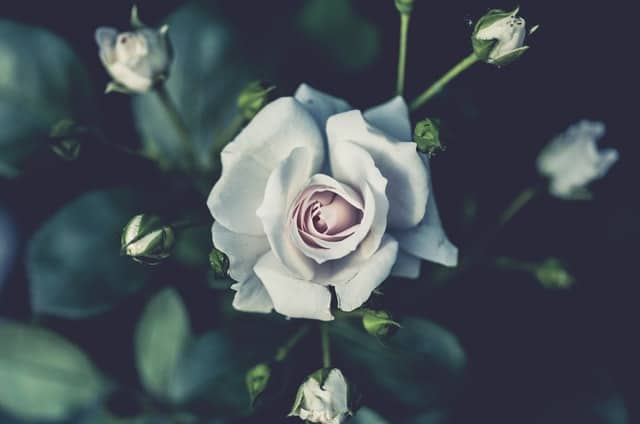Every day in this world is a shaky, uncertain, constantly changing landscape — and that causes us to try to get control.

Chaos
We create lists, systems, routines, schedules, comfort foods, comfortable environments we build our whole lives and identities around these comforts and control. We try to control the uncontrollable ever-shifting landscape of our lives.
And it doesn’t work. You can’t get a firm grasp on the fluidity of life. And so we get stressed, procrastinate, feel hurt, get depressed or anxious, get angry or frustrated, lash out or complain.
Into this craziness I’d like to suggest the ridiculously awesome practice of surrendering.
What does this mean? It’s the idea of letting go of some of our systems and instincts to get control, trying to make the world exactly as we like it, trying to avoid all the things we dislike and instead, relaxing, accepting, even surrendering to the uncertainty and fluidity of this world.
Surrendering means we relax into the shifting landscape. We let go of trying to control everything, and smile with friendliness at the world as it is, beautiful and amazing.
Anxiety and Depression Counseling Chicago
Jana Fuchs, LCPC Owner and Founder of JF Counseling and Consulting specializes in therapy anxiety counseling for depression. My goal as a therapist is to help you find solutions that work for you and your individual needs. Search for a therapist near me and you will find I am located near West Lincoln Park and Bucktown in Chicago, IL 60614.
Surrender vs. Control Strategies
Surrender sounds lame to many people, or perhaps scary. It’s the opposite of what we are constantly trying to do — we are always seeking control, because we don’t like uncertainty. At all.
We want to control our day, so we have routines, schedules, systems. We create systems for our work, try to get control over our health through new diets or exercise programs, try to control our relationships, our future, our finances.
And there’s nothing wrong with any of this except that it’s a bit futile to try to control the uncontrollable. It’s like trying to build a building out of water — you keep trying and keep trying, but it’s just not a solid building material.
So control is a strategy that isn’t actually effective, even if it’s completely understandable. What effects does it have?
Constantly trying to get control results in:
- Stress and anxiety about not having control
- Being driven by fears
- Not being happy with how things are (because they’re not in control)
- Getting some degree of control over things, but still not feeling in control — so you keep seeking it, resulting in constant striving, anxiety
- Lashing out at others when they interfere with your controlled world
- Spending time, money, energy, and other valuable resources constantly trying to get control
- Feeling lost, depressed, unhappy with yourself and the world when you can’t get control (which is inevitable)
Now, I’m not saying we should never try to get control. There are helpful ways of getting control, but often it’s more helpful to shift the focus from control to love — taking care of yourself can be a loving act rather than an attempt to gain control over your health, for example.
What would it be like, instead of trying to get control, to surrender instead? It might look like being fully present in this moment, experiencing the sensations of the moment, being curious about it. It might look like acceptance of how things are. In fact, there are lots of ways surrender might look let’s talk about how amazing they might be.
Why Surrender is Ridiculously Awesome

Taking a moment
So we pause our striving to control and we relax. We stop trying to change things and just become present.
We tune in to how we’re feeling. We notice the sensations of the moment, both in our bodies and all around us. We become present to whoever is in front of us. When we do a task, we pour ourselves fully into it.
We open to the uncertainty of the moment. We see what we can learn from it, with an open mind, with curiosity and a stance of not-knowing instead of a fixed viewpoint.
We start to appreciate the moment in front of us, fully. There is something immensely awesome about the moment in front of us, if we stop trying to change it, trying to control it, trying to have it conform to our idea of how things should be. Just as it is, it’s worthy of our appreciation, gratitude, love.
We can fall in love with the moment, just as it is, if we open to it.
Surrender is all of this and more. It’s openness, full presence, awareness of what’s happening, curiosity and immense appreciation. And it takes so much less energy than control.
How to Practice Surrender
I am not advocating a complete giving up of control of all areas of your life. Obviously this could lead to financial ruin, the ruination of relationships and your work and health and more.
But before we grasp for control, we can try surrender as a way to practice with whatever is coming up and perhaps to accept things as they are a bit more, and need to control less.
For example I might be feeling like my health is out of control, and feeling some anxiety about it and so I want to go on a diet and set up an exercise plan and get everything under control. Now, these are not bad intentions, but we know that this kind of fear-based approach often doesn’t work. You never stop feeling out of control.
So instead, I practice surrendering, and feel the fears coming up for me. I relax a bit and see that I’m suffering, that I could use some self-love. I also notice that instead of being unhappy with my health, I could love my body, love this moment as it is, even if it contains some pain and discomfort. Relaxing, surrendering, loving things as they are I can set an intention to love myself with nourishing food and movement.
The surrendering doesn’t mean that I don’t take action — it means that I accept things as they are, and yet bring a loving intention into the equation. How can I love things as they are and have my actions come from a place of love as well?
Coming from a place of love instead of fear is powerfully transformative.
And even if I never take that loving action in the future the present is transformed as well. This moment is completely different for me if I’m not grasping for the illusion of control, but instead loving what is.
So here are some ways to practice surrender:

Body
- Notice that you’re looking to control things, and instead pause. Drop into your body and notice the fear, uncertainty, anxiety that is causing you to want to get control. Stay with this physical sensation in your body, the energy of uncertainty, that causes you to grasp for control. Be with it fully, allowing yourself to feel it. Relax and surrender to it.
- Open yourself to the rest of the moment, noticing how freaking amazing this moment is if you open up and pay attention. See it with fresh eyes, as if you’ve never experienced this moment before. Bring wonder and curiosity into this new viewing of the world.
- Let yourself rest in openness — you don’t need to control things, you don’t need to know exactly what will happen, but instead, you an find an ease in the openness of this moment, the unknown quality of a beautifully shifting landscape.
- How can you love yourself and everything around you in the middle of this openness? Can you fall in love with this moment?
- What loving intention can you set for yourself in this situation? Coming from a place of love instead of fear, what would be the best next small step to take?
What a world we live in, if only we can fully see it. Surrendering is the way to move into that.

Nature
